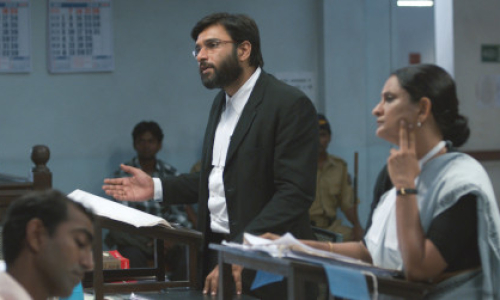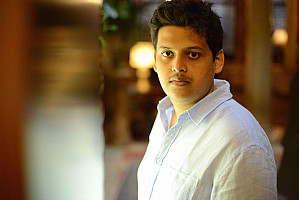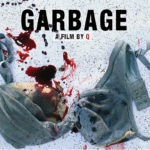Judgement Day for Court
I write this fresh out of a screening of Court at a suburban theatre in Mumbai. It was surprisingly packed. Surprising, because this was a multilingual film with no stars to speak of, no fancy PR machinery at work, and claiming to portray a realistic version of the Indian courtroom (a phenomenon that has been otherwise abused by the average Bollywood potboiler). For those who are looking for ‘inhe kanoon ke hawale kar do‘ or ‘Milord, aapki adalat mein aisa kaise ho sakta hai?’ will be in for a rude shock. However, equally bizarre things are said and done in the movie. A woman is denied a hearing because of wearing a sleeveless t-shirt to court. Thirty people are produced in front of the judge because they were travelling in the handicapped compartment of a train – all free to go after a fine of Rs 500 and a gentle warning. But the focal case at hand tops it all. Narayan Kamble, a Marathi folk singer played by Vira Sathidar, is convicted on the charge of belting out a song that allegedly instigated a municipal worker to commit suicide. His advocate, Vinay Vora, (played by producer Vivek Gomber) tries his best to logically fight a case which lacks any sort of common sense. Geetanjali Kulkarni plays public prosecutor Nutan with finesse. Inciting rage, irritation and concern in the audience for her character. The one thing you don’t feel for her is pity. A job well done. Sure there were a few sluggish moments in the film. Most of the scenes outside of the courtroom seemed to drag. Although hilarious and integral to the plot, they made you crave the setting you were taken away from. Also, the film climaxed one too many times. That said, it is a brave first film by director Chaitanya Tamhane.
Which brings us to the man who conceived this dark horse. Tamhane along with friend and producer Vivek Gomber set about making a film that they knew would not be received easily by the Indian audience and in fact, the Indian film industry, would require a tedious casting and shooting schedule and most probably, would not yield the returns that a safer option would. Winning 19 awards at film festivals across the world, Court made the sort of noise that mainstream cinema, with all its shenanigans, hopes to emanate. More power to such cinema. More power to the mavericks behind such cinema, who dare to produce offbeat work. At 27, Tamhane tasted the kind of success few achieve in their first attempt. A National Award adding to your wall of trophies can both be a burden as well as huge booster. What he is worried about, though, is the nationwide release of the film that happened on April 17. Will the audience here like it as much as the film festival folk, he wonders. We met the quixotic director at his office, which was squirrelled away in an obscure part of Goregaon. Here’s what he had to say about his film.
Why a courtroom drama?
“Even I didn’t know there would be a courtroom drama because I’m not particularly a fan of genre films and I don’t watch too many courtroom dramas. I was watching a typical courtroom TV show and wondering why we always see the High Court or the Supreme Court and why are they always so dramatic and loud. I wanted to explore how it must be in an actual courtroom. I attended a session in a Magistrate Court and was utterly fascinated. I saw constables scolding people for sitting cross-legged, for not putting phones on silent, 30 people were arrested because they were travelling in the handicapped compartment of a train, somebody’s watch was stolen by their neighbour. This was very different from what I had thought or what my notions were. That’s where I began my research; spending more time in the courtroom.”
Which court did you go to?
“I went to the Magistrate Court in Andheri and the Sessions Court in Goregaon.”
Tell us a little about the process of making Court.
“It’s been a long journey – three and a half years now. it started off with a conversation between two friends. One day, Vivek Gomber, who is the producer and the lead actor in the film, saw me very depressed and broke and asked me why I was in such a state. I told him that I had an idea and wanted to develop a film but didn’t have the money to sustain it. That’s when he offered to help me develop the script and said that we should go ahead and do it. It was an awkward proposition but he convinced me to accept it. Since then to now, when we are finally releasing the film, it’s been an interesting journey because we have no industry support or backing or studio presenting the film. We literally started everything from scratch. We’ve taken a lot of time for all these processes. One year of scripting, one of pre-production, one of shooting and post-production and now 6-7 months travelling to different festivals and working on the India release. So it’s basically the two of us who said we’d make a film and we have seen it through.”
Did you expect to release it outside before formally releasing it in the country?
“Actually, we had no clue how it would be received outside because it’s such a culture-specific film set in Mumbai, Maharashtra. We didn’t know if people would understand the concept of a folk artist from Maharashtra or how the Indian judiciary works. Surprisingly, people have responded well. In India, we were worried that these kind of films generally don’t get an audience or platform, but after the win at MAMI, and the National Award, things have changed and there’s some good word-of-mouth-publicity.”
Did you try to release it here before taking it abroad?
“No, we didn’t even try because we know that it’s difficult for these kinds of films. Our strategy from the beginning was to premiere at a good festival and hopefully get some traction there, which gets translated into something here.”
What were you doing before this?
“I’d made a short film called Six Strands with which I toured a to different film festivals. Before that I did a play, Grey Elephants in Denmark, which was performed at Prithvi and NCPA. This was where I met Vivek for the first time. He was the lead actor. Before that, I did a documentary about plagiarism in Indian cinema.”
As a first-timer, what was the biggest challenge while making the movie?
“A lot of people said that this film is too ambitious for a first time filmmaker. And also, I’m not formally trained from anywhere. I’m an English literature graduate from Mithibai College, which I joined to do theatre! The biggest challenge was shooting in real locations in Mumbai. Also, non-professional actors and long takes and to convince people…”
How did you go about the process of distribution?
“In the beginning, we had tried approaching other people to release the film. We were hoping to release it through somebody else. But we realised that these people don’t have the vision. They wanted to take a different film and release it in the conventional way, which we were not okay with. The seven ads in mainstream media, getting a star presenter to talk about it – this is not that film. This is a different film and it has to be marketed differently. Also, we didn’t want to lose control over the project. To be at the mercy of a studio that will acquire it one year later and release it after three years, somebody putting an item song in it – we didn’t want to do any of that. It was very overwhelming in the beginning. We didn’t know anything about distribution. Somehow, we met people through the way who gave us the confidence that this can be done. Vivek mastered the courage to put up more money for the publicity and advertising. We have tried a few crazy ideas with the film. We have a dual marketing strategy, two publicists, two posters, a lot of activity on the grassroots level, so we’re very curious to see how our way of marketing pays off.”
But doesn’t a star presenter help the film?
“Sure, it does. But I think people have become smarter and realised that these stars are not acting in the films. And then you’re attracting a very different audience, who after a day or two, will realise that this isn’t for them. And negative publicity by word of mouth isn’t what you want for your film.”
Did you face any problems in terms of censorship or political backlash?
“They asked for two different cuts, two mutes in the dialogues of the film and we had to comply. We of course had to sign an undertaking that stated that we are responsible for any political backlash coming our way. We are expecting a few lawsuits our way once the film releases!”
Is the Indian judiciary close to what you have depicted in your film or is this a very exaggerated version?
“We are not trying to say that the Indian judiciary is in doldrums or any such thing. It actually talks about the people who comprise the system; the people who run the system and the structural and human failings in not just the Indian judiciary but any institution, or any kind of a place with power dynamics.”
Any anecdote you remember from the making of the film?
“There were members from the Anti-Terrorist Squad who had come on our set claiming that there’s a Naxalite from Nagpur making a movie and started looking for him. Vira Sathidar, who plays the lead character of Narayan Kamble, is from Nagpur and is a human rights activist who is politically involved. We had to hide him in a room! We were very worried because he had not shot the main scene of the film – the scene that kind of starts the film, and everybody was worried that if he gets arrested now, we are in deep trouble.”
How does it feel to receive all the adulation from national and international parties?
“It is a little dreamlike and surreal because we feel really blessed with this kind of unanimous acclaim and acceptance. We also feel the pressure. What are we going to do next? How can we ever live up to these kind of expectations and hype, because this looks like a once-in-a-lifetime happening.”
How would you sell the film? What would you say to present it?
“I would say that there is a misconception about films that go to festivals or win awards; that they are boring films. Where there’s a fly for 20 minutes on screen…it’s not that kind of film! It’s unexpectedly hilarious. it’s got a lot of dry humour and satirical elements and it’s a subversion of the courtroom drama genre. Even if you love courtroom dramas, you will see something original, which is why people should see it.”
What’s next?
“I’m developing a sitcom for the Web and also working on my next feature, which will have elements of a musical in it.”
Related posts from Verve:
Verve Trending
Sorry. No data so far.
us on Facebook to stay updated with the latest trends








